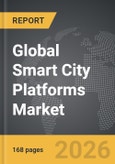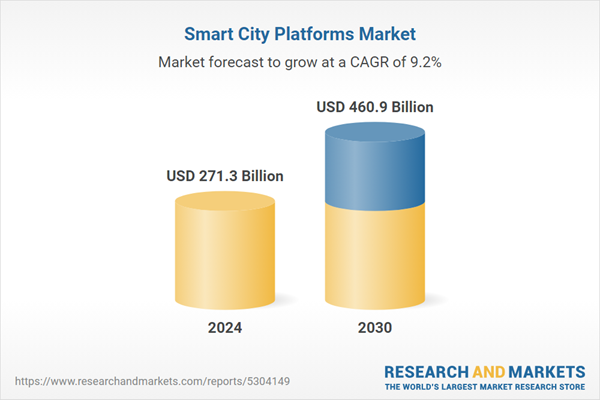Global Smart City Platforms Market - Key Trends and Drivers Summarized
How Are Smart City Platforms Enabling Urban Transformation?
Smart city platforms are integrated technological solutions designed to support the efficient management of urban infrastructure, services, and resources. These platforms leverage IoT, AI, big data, and cloud computing to enable seamless communication, data exchange, and real-time monitoring across sectors such as transportation, energy, public safety, and waste management. By providing centralized control and analytics, smart city platforms help cities improve operational efficiency, reduce resource consumption, enhance public services, and promote sustainable urban development. As cities worldwide aim to become more connected and sustainable, smart city platforms have emerged as critical tools for transforming urban living.What Are the Key Segments in the Smart City Platforms Market?
Major components include software, hardware, and services, with software holding the largest market share due to its role in data integration, management, and analytics. Key applications encompass transportation management, energy management, public safety, and environmental monitoring, with transportation management representing a significant segment driven by the need for efficient traffic management, smart parking, and public transit systems. End-users include municipalities, government agencies, utilities, and technology companies, with municipalities leading the market as they adopt smart solutions to improve urban services and infrastructure.How Are Smart City Platforms Being Integrated Across Urban Sectors?
In transportation, smart city platforms facilitate intelligent traffic management, real-time public transit tracking, and automated toll systems, reducing congestion and improving mobility. Energy management applications include smart grids, energy usage monitoring, and predictive maintenance of energy infrastructure, contributing to reduced energy consumption and better grid reliability. For public safety, smart city platforms integrate surveillance systems, emergency response coordination, and crime analysis, enhancing safety and security in urban areas. Environmental monitoring uses IoT sensors connected to smart city platforms for air quality tracking, waste management, and water usage monitoring, supporting sustainable urban development. Additionally, these platforms enable citizen engagement through mobile apps and digital services, improving public access to information and services.What Factors Are Driving the Growth in the Smart City Platforms Market?
The growth in the Smart City Platforms market is driven by several factors, including increasing urbanization, which has created demand for efficient management of infrastructure and public services. Government initiatives promoting smart city development and digital infrastructure investments have accelerated the adoption of these platforms globally. Advancements in IoT, AI, and cloud technologies have improved the functionality, scalability, and integration of smart city platforms, supporting broader applications across transportation, energy, and public safety. The need for data-driven decision-making, improved resource management, and enhanced citizen services has further fueled demand for smart city solutions. Additionally, the growing focus on sustainability, environmental monitoring, and resilience in urban planning has contributed to market expansion, as cities aim to become more livable and future-ready.Report Scope
The report analyzes the Smart City Platforms market, presented in terms of market value (US$ Thousand). The analysis covers the key segments and geographic regions outlined below.- Segments: Offering (Platforms, Services); Delivery Model (Hybrid, Offshore, Onsite); Application (Smart Transportation, Public Safety, Smart Energy & Utilities, Infrastructure Management, Citizen Engagement).
- Geographic Regions/Countries:World; United States; Canada; Japan; China; Europe (France; Germany; Italy; United Kingdom; and Rest of Europe); Asia-Pacific; Rest of World.
Key Insights:
- Market Growth: Understand the significant growth trajectory of the Smart City Platforms segment, which is expected to reach US$294.4 Billion by 2030 with a CAGR of a 8.8%. The Smart City Services segment is also set to grow at 10% CAGR over the analysis period.
- Regional Analysis: Gain insights into the U.S. market, valued at $76.2 Billion in 2024, and China, forecasted to grow at an impressive 8.6% CAGR to reach $70.2 Billion by 2030. Discover growth trends in other key regions, including Japan, Canada, Germany, and the Asia-Pacific.
Why You Should Buy This Report:
- Detailed Market Analysis: Access a thorough analysis of the Global Smart City Platforms Market, covering all major geographic regions and market segments.
- Competitive Insights: Get an overview of the competitive landscape, including the market presence of major players across different geographies.
- Future Trends and Drivers: Understand the key trends and drivers shaping the future of the Global Smart City Platforms Market.
- Actionable Insights: Benefit from actionable insights that can help you identify new revenue opportunities and make strategic business decisions.
Key Questions Answered:
- How is the Global Smart City Platforms Market expected to evolve by 2030?
- What are the main drivers and restraints affecting the market?
- Which market segments will grow the most over the forecast period?
- How will market shares for different regions and segments change by 2030?
- Who are the leading players in the market, and what are their prospects?
Report Features:
- Comprehensive Market Data: Independent analysis of annual sales and market forecasts in US$ Million from 2024 to 2030.
- In-Depth Regional Analysis: Detailed insights into key markets, including the U.S., China, Japan, Canada, Europe, Asia-Pacific, Latin America, Middle East, and Africa.
- Company Profiles: Coverage of players such as Alibaba, AWS, Bosch.io, CIMCON Lighting, Cisco and more.
- Complimentary Updates: Receive free report updates for one year to keep you informed of the latest market developments.
Some of the 34 companies featured in this Smart City Platforms market report include:
- Alibaba
- AWS
- Bosch.io
- CIMCON Lighting
- Cisco
- Ericsson
- Fujitsu
- Fybr
- Hitachi
- Huawei
- IBM
- Intel
- KaaIoT Technologies
- Microsoft
- NEC
- Oracle
- SAP
- Schneider Electric
- SICE
- Siemens
- Sierra Wireless
- Siradel
- Smarter City Solutions
- thethings.iO
- Ubicquia
This edition integrates the latest global trade and economic shifts into comprehensive market analysis. Key updates include:
- Tariff and Trade Impact: Insights into global tariff negotiations across 180+ countries, with analysis of supply chain turbulence, sourcing disruptions, and geographic realignment. Special focus on 2025 as a pivotal year for trade tensions, including updated perspectives on the Trump-era tariffs.
- Adjusted Forecasts and Analytics: Revised global and regional market forecasts through 2030, incorporating tariff effects, economic uncertainty, and structural changes in globalization. Includes historical analysis from 2015 to 2023.
- Strategic Market Dynamics: Evaluation of revised market prospects, regional outlooks, and key economic indicators such as population and urbanization trends.
- Innovation & Technology Trends: Latest developments in product and process innovation, emerging technologies, and key industry drivers shaping the competitive landscape.
- Competitive Intelligence: Updated global market share estimates for 2025, competitive positioning of major players (Strong/Active/Niche/Trivial), and refined focus on leading global brands and core players.
- Expert Insight & Commentary: Strategic analysis from economists, trade experts, and domain specialists to contextualize market shifts and identify emerging opportunities.
Table of Contents
Companies Mentioned (Partial List)
A selection of companies mentioned in this report includes, but is not limited to:
- Alibaba
- AWS
- Bosch.io
- CIMCON Lighting
- Cisco
- Ericsson
- Fujitsu
- Fybr
- Hitachi
- Huawei
- IBM
- Intel
- KaaIoT Technologies
- Microsoft
- NEC
- Oracle
- SAP
- Schneider Electric
- SICE
- Siemens
- Sierra Wireless
- Siradel
- Smarter City Solutions
- thethings.iO
- Ubicquia
Table Information
| Report Attribute | Details |
|---|---|
| No. of Pages | 168 |
| Published | February 2026 |
| Forecast Period | 2024 - 2030 |
| Estimated Market Value ( USD | $ 271.3 Billion |
| Forecasted Market Value ( USD | $ 460.9 Billion |
| Compound Annual Growth Rate | 9.2% |
| Regions Covered | Global |









